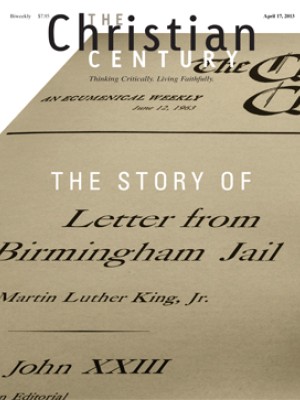Gordon Cosby, 95, pioneer in missional thinking
Gordon Cosby, the founder of the Church of the Saviour in Washington, D.C., and a pioneering Christian activist whose ministry foreshadowed both the missional and emergent church movements, died March 20 at 95.
Cosby died at Christ House, which provides medical care to Washington’s homeless—one of several ministries initiated by the Church of the Saviour, a church which Cosby and his wife, Mary, started with seven other members in 1947.
Born in Lynchburg, Virginia, Cosby grew up attending Rivermont Avenue Baptist Church there, and at age 15 met his wife when her father, Ernest Campbell, became the church’s pastor. The same year, he began preaching to a black congregation in a one-room church outside of town, and four years later he enrolled at Southern Baptist Theological Seminary in Louisville, Kentucky.
In 1942, seminary completed, Cosby enlisted in the U.S. Army and served as a chaplain in Europe for the rest of World War II. He later told the Washington Post that he returned “feeling that denomination and race were artificial constructs and that people should live in regular life as they would in war—willing to lay down their lives for their neighbors, viewing their faith as an urgent tool to change the world.”
Read our latest issue or browse back issues.
That faith perspective launched the Church of the Saviour in Washington’s Adams Morgan neighborhood. Cosby remained there until he retired in 2009. The Post said the church had no pews, no Sunday school or Christmas services.
“He wrote no books,” said Wes Granberg-Michaelson, general secretary emeritus of the Reformed Church in America, who, working on Capitol Hill in his twenties, regarded Cosby as his mentor. “He changed my life,” said Granberg-Michaelson, now a leading figure in interreligious dialogues.
Elizabeth O’Connor, a longtime church member, wrote several books about Cosby, starting with Call to Commitment, published in the 1960s. Cosby taught followers to integrate two journeys: an inward one of growth in love of God, self and others and an outward one to mend creation.
After 1994, the Church of the Saviour became a “scattered community” of nine congregations, each independently structured but sharing common values.
The membership process includes participating in a mission group and classes in the church’s School of Christian Living, as well as joining the community in worship. Annually, after a period of intentional discernment, all members renew—or withdraw—their covenantal membership.
Just before his 90th birthday, Cosby told a group of students from Baylor University’s School of Social Work that Christians must maintain a keen awareness of situations in their communities. “We want to care about the people Jesus cared about, the least of these, and give them a chance,” he said. —ABP, added sources





